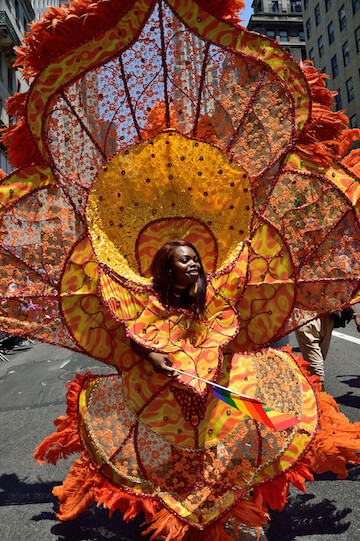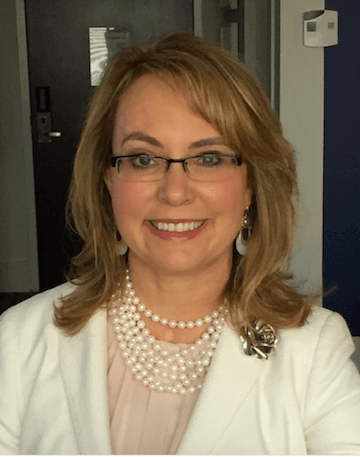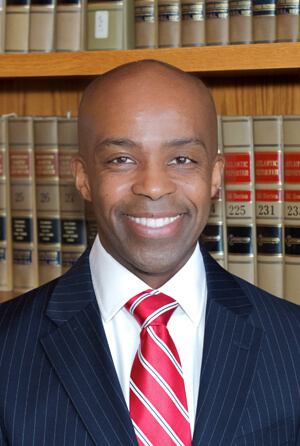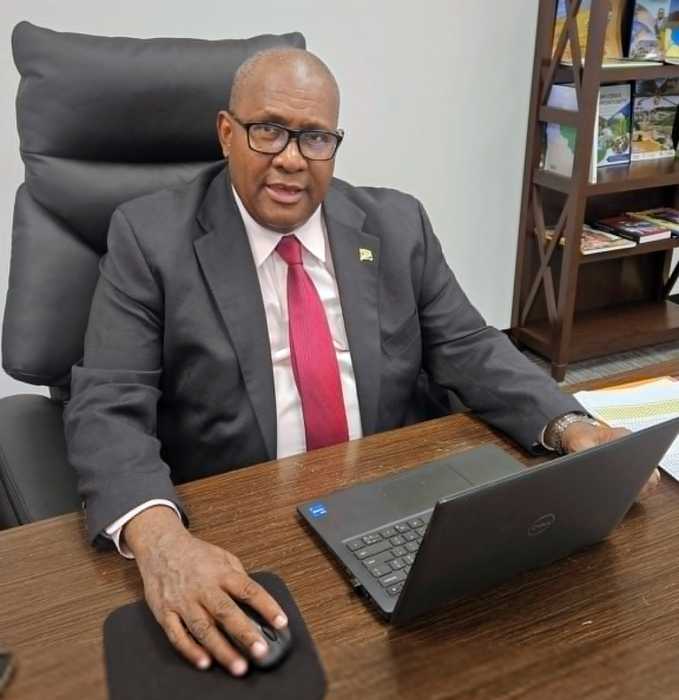COVER DESIGN BY MICHAEL SHIREY.
BY ANDY HUMM | The Orlando massacre of June 12 could well have cast a pall over LGBT pride celebrations across the country, giving us pause about parading down the street when there are those out there who wish us harm. Instead, the community and our allies were defiant, coming out in palpably greater numbers than ever before. Some activists who had skipped the march in recent years returned, and it was peppered with more immediate meaning and a political bent that well might have waned after the big marriage victories in Albany in 2011 and at the US Supreme Court in ‘13 and ‘15.
The New York march down Fifth Avenue on Sunday, June 25, this reporter’s 43rd, stepped off at noon from Midtown and the last contingent did not disperse in the West Village until 8:30 p.m. — a glacial pace in need of reform. It is, however, an indication of just how many groups want to be in the march, including scores of corporate contingents that advertise their desire for the community’s patronage and have their LGBT employees demonstrate that they work in an accepting environment.
“Pride in Flight” for LGBT people in the airline industry was, not surprisingly, a large contingent. But the Gay Officers Action League, which started out in 1982 with one out cop, Charlie Cochrane, accompanied by a few others in various modes of disguise, now had a thousand in their contingent and 300 uniformed officers, including Aiden Budd and Brooke Bukowski carrying a banner as the first out transgender officers in the NYPD. FIRE FLAG, the LGBT group for the Fire Department, has also grown significantly, augmented by many in the emergency medical services.
Anger at anti-LGBT religious, political hate and at guns takes center stage
The New York office of the FBI — the FBI! — marched for the first time with 50 in its contingent. Jessica Gonzalez, LGBT coordinator for the New York office, said, “We’re not the old bureau” — a reference to the not-so-distant past when the FBI’s main role viz-a-viz the community was conducting surveillance of LGBT and AIDS groups and sometimes infiltrating them.
Joseph Santiago (at r., holding banner), 25, moved to Brooklyn from Orlando just five days before the massacre at Pulse nightclub. | ANDY HUMM
Orlando was seared into the hearts of many in the march — from the huge contingent from Gays Against Guns to an Oasis float that managed to combine disco music and pictures of the 49 martyrs. On the sidelines on Christopher Street was Joseph Santiago, 25, holding a banner with these pictures, too. He had just moved to Brooklyn from Orlando on June 7 and pointed to five of the murdered men he counted as personal friends.
“I want people all over the world in GLBT communities to feel safe,” he said.
There was anger about the easy availability of guns to kill us and about the hate behind the triggers.
“We as Americans have to stop the hate,” out gay Assemblymember Danny O’Donnell said, “and hold leaders — political and religious — responsible for their hate.”
Out gay State Assemblymember Daniel O’Donnell | DONNA ACETO
What about all the government money that goes to anti-LGBT religious groups, whether in non-profit social service funding, reimbursement for parochial school security expenses, or below-market rents for weekend worship use of the public schools?
“We should put a stop to that,” he said, a heavy lift in a city and state where many politicians rely on blocs of right-wing religious groups for their elections.
Assemblymember Deborah Glick, the first out state legislator, originally elected in 1990, said, “We’ve seen that these organizations spew hate and hide behind ‘religious freedom.’ There needs to be a complete review of the ways in which resources are directed to the religious community over and above basic tax-exempt status.” She lamented Governor Andrew Cuomo’s push for tax credits for religious schools, though, as in the past, Assembly Democrats were able to block it.
State Assemblymember Deborah Glick. | DONNA ACETO
Former City Councilmember Margarita Lopez, an out lesbian, said, “Until all the religions — Christian, Jewish, Muslim, and Buddhist — all accept that we are children of God like everybody else, the gay fight is not over.”
Cardinal Timothy Dolan, the Catholic archbishop of New York, may have allowed a gay Irish contingent into the St. Patrick’s Day Parade, but the anti-gay massacre did not move him to make peace with his brothers and sisters in Dignity/ New York, who silently witnessed outside St. Patrick’s Cathedral once again the morning of the march. How simple it would have been for him to step out and make a sign of solidarity in the wake of Orlando, but it was beyond him.
Lewis Speaks-Tanner, president of Dignity USA, said that of the statements made by bishops nationwide about Orlando, “all but four of them made no mention of the LGBT community.”
St. Francis Xavier in Chelsea, which expelled Dignity from its worship space in 1987 but has in recent years become known as an LGBT-friendly parish, marched with its banner face forward after having turned it around several years ago under pressure from the Archdiocese.
Brendan Fay of Lavender & Green, which led the big LGBT contingent in the St. Patrick’s parade, said, “The hateful speech from the pulpits has to end. I’d like to see the pope and Church leaders apologize to the LGBT community for their theology that defines us as intrinsically disordered.”
Police Officers Aiden Budd and Brooke Bukowski, the NYPD’s first out transgender uniformed members. | DONNA ACETO
Later that Sunday on his plane home to Rome, Pope Francis said to reporters, “I believe that the Church not only should apologize to the person who is gay whom it has offended,” but to others. Yet he was not pressed on specifically what he has to apologize for nor did he apologize for the Church’s condemnation of homosexual love or the Vatican’s continued role in opposing LGBT rights in the civil sphere worldwide.
Allen Roskoff, president of the Jim Owles Liberal Democratic Club, was at the first march commemorating the Stonewall in 1970 and has attended all but one in New York. He echoed the push for gun control, but also wants the federal LGBT rights bill passed, saying, “The Human Rights Campaign and Barney Frank set us back decades by replacing the comprehensive LGBT rights bill with ENDA,” a gay employment bill in which transgender people were jettisoned as a means of securing passage in the House — and only there — in 2007.
Among the City Council contingent were (from l.) Jimmy Van Bramer, Ritchie Torres, Carlos Menchaca, and Corey Johnson. | DONNA ACETO
Out gay Councilmember Corey Johnson said the challenge is “to mobilize the community for a ban on guns. We need the Democrats to win the House and Senate and keep the presidency or we’re fucked.”
He added that until we end “homelessness for LGBT youth and HIV/ AIDS, the fight is not over.”
Out gay State Senator Brad Hoylman said, “Republicans are divided this year and Democrats are strong. We will have a united front” if Democrats take back the State Senate where many LGBT and AIDS initiatives are now stalled.
Senator Chuck Schumer, who stands to become majority leader if the Democrats take back the Senate this fall, said that the Equality Act, comprehensive legislation that adds sexual orientation and gender identity to the classes protected under the 1964 Civil Rights Act, “is a high priority” for him.
Though “Republicans don’t want to bring it up,” he said. “We are close!”
Grand marshal Subhi Nahas, a Syrian refugee who founded that nation’s first LGBT magazine. | DONNA ACETO
Out gay Hudson Valley Congressmember Sean Patrick Maloney, who has been attaching LGBT rights amendments to pending bills on the floor of Congress, said, “A majority of the House supports anti-discrimination legislation, but Republicans use the process to stop it. It would pass today if we could bring it to a vote.”
Out gay Councilmember Danny Dromm said, “We must continue to push for LGBT history in our schools,” a still unrealized goal despite his push for it as chair of the Education Committee, the appointment of an LGBT liaison in the schools, and the Department of Education’s first celebration of Pride Month this June.
Juanita Ramos, “a black, Puerto Rican lesbian feminist socialist activist and academic,” whose first pride march was in 1978, said, “We’re not safe anywhere. We have to push our issues for those who can’t come out.”
Veteran activist Tom Burrows said, “I’m pushing programs for LGBT incarcerated people. We have not been good to our people who are incarcerated. We have to welcome them back to the community” when they get out.
Presumptive Democratic presidential nominee Hillary Clinton surprised the crowds with an unannounced drop-in to the Pride March near the Stonewall Inn. | MELISSA SKLARZ.
For the first time, the FBI had a contingent in the New York Pride March. | ANDY HUMM
Comedian, actress, and chanteuse Lea DeLaria. | DONNA ACETO
Mayor Bill de Blasio and his wife, Chirlane McCray. | DONNA ACETO
Randi Weingarten, president of the American Federation of Teachers, and her partner, Rabbi Sharon Kleinbaum of Congregation Beit Simchat Torah. | DONNA ACETO
About 300 uniformed members of the NYPD marched with the Gay Officers Action League. | DONNA ACETO
PHOTO BY DONNA ACETO.
PHOTO BY DONNA ACETO.
PHOTO BY DONNA ACETO.
PHOTO BY DONNA ACETO.
PHOTO BY DONNA ACETO.
PHOTO BY DONNA ACETO.




















































